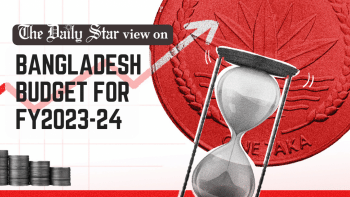Proposed budget is grossly inadequate

There is no denying that preparing a budget at this hour of crisis is a difficult task. But that is what makes the formulation of a realistic, effective and implementable budget all the more important. Unfortunately, as experts across the nation have expressed, the budget proposed by the finance minister failed to live up to that task and the expectations of the people.
There is no reason to believe the government will be able to achieve the revenue target proposed in the budget. And that will only widen the already significant budget deficit. All available options in terms of financing the deficit will put a greater burden on the economy – on small and medium enterprises in particular, as well as downwards from the middle class. For example, should the government choose to borrow more from Bangladesh Bank – print more money – it will only further fan the flame of inflation, which would make life most difficult for the already struggling middle class and lower income groups.
The overall budget is not at all pro-people – not for the majority at least. It provides very little relief for the middle class who arguably face the greatest burden (as the government will rely heavily on indirect taxes), while the social safety net allocation will barely provide any cushioning for vulnerable groups. These decisions, alongside the proposed relief for the rich, shows that the government has consciously chosen to ignore the two most important problems presently plaguing our economy: inflation and inequality. Hence, the budget proposed no concrete measures to tackle inflation, and nearly altogether ignored the inequality issue. Similarly, it did not provide any remedy for default loans or the forex reserve crisis, both of which have resulted in Moody's downgrading Bangladesh's sovereign rating – which could be very bad news for the economy.
Development allocation for education has decreased, getting us farther away from the Unesco-recommended six percent allocation of total GDP. And the development allocation for healthcare has also decreased – although the operation allocation has increased, which mostly concerns salaries, etc – which could further worsen the quality of our healthcare system.
Instead of addressing our biggest economic challenges – corruption, for example – the budget, over the years, has become a tool to further extend benefits to wealthy and politically connected groups. And this budget is no different. It fails to ensure better utilisation of government subsidies, most of which ends up in the pockets of the politically connected, and ignores much-needed reforms and policy changes. The government should, therefore, revise it considerably – keeping in mind the concerns expressed.


 For all latest news, follow The Daily Star's Google News channel.
For all latest news, follow The Daily Star's Google News channel. 








Comments